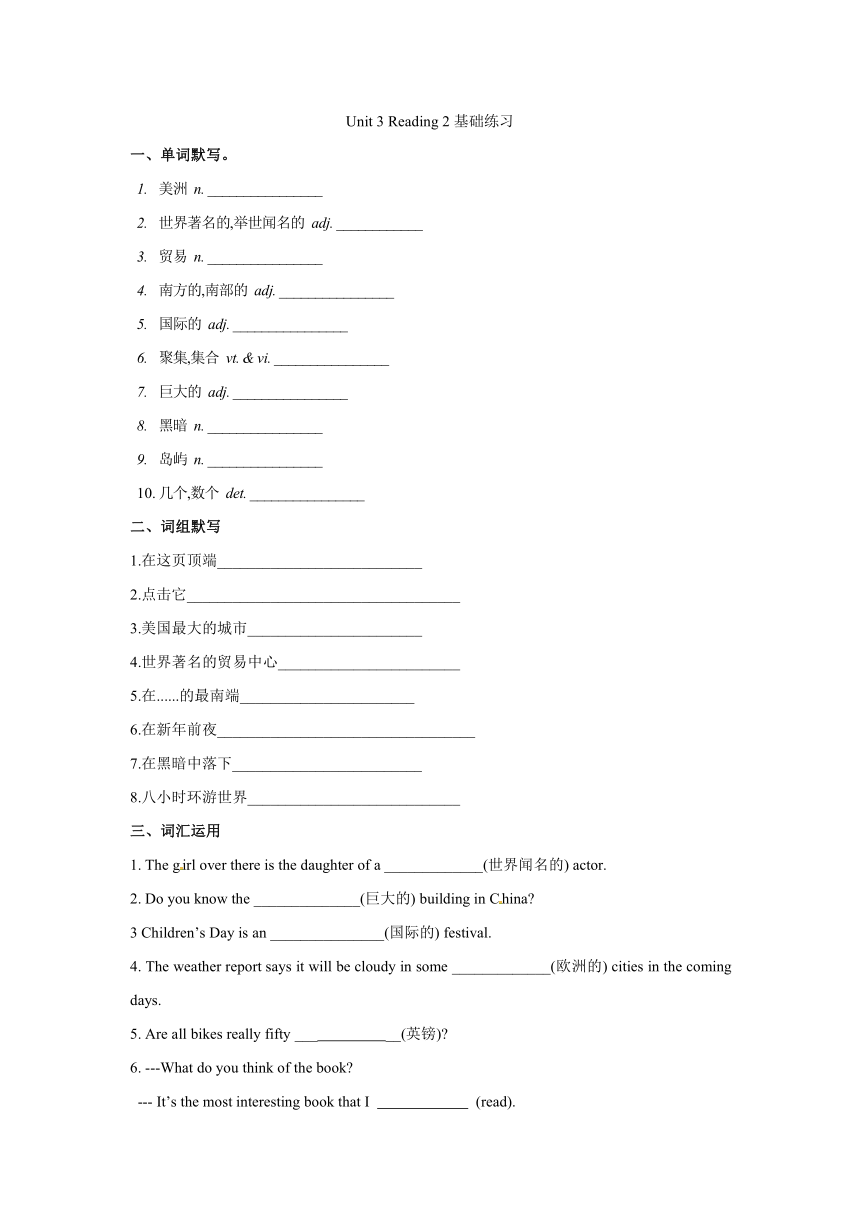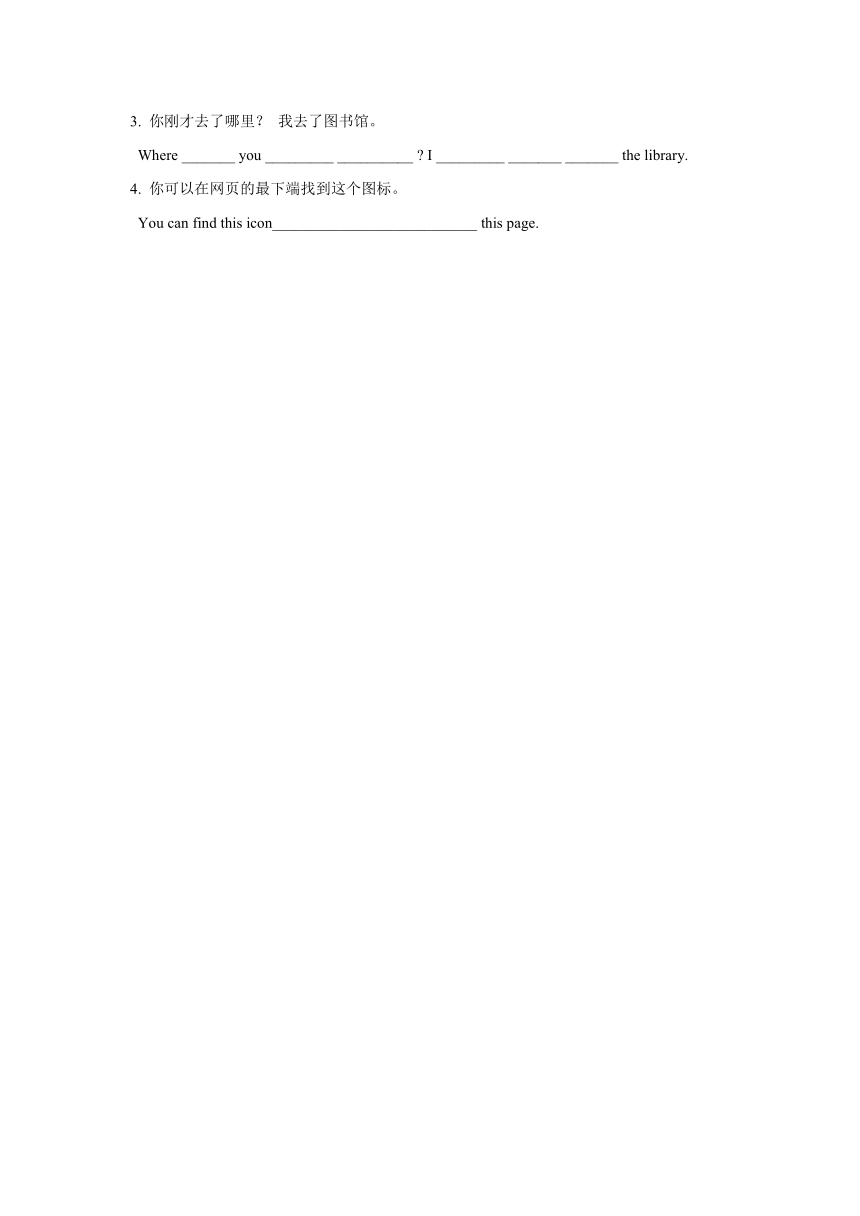Unit 3 Online tours Reading 2 基础练习(含解析) 2024-2025学年牛津译林版八年级英语下册
文档属性
| 名称 | Unit 3 Online tours Reading 2 基础练习(含解析) 2024-2025学年牛津译林版八年级英语下册 |  | |
| 格式 | docx | ||
| 文件大小 | 31.0KB | ||
| 资源类型 | 教案 | ||
| 版本资源 | 牛津译林版 | ||
| 科目 | 英语 | ||
| 更新时间 | 2025-02-12 09:38:07 | ||
图片预览



文档简介
Unit 3 Reading 2基础练习
单词默写。
美洲 n. ________________
世界著名的,举世闻名的 adj. ____________
贸易 n. ________________
南方的,南部的 adj. ________________
国际的 adj. ________________
聚集,集合 vt. & vi. ________________
巨大的 adj. ________________
黑暗 n. ________________
岛屿 n. ________________
几个,数个 det. ________________
词组默写
1.在这页顶端___________________________
2.点击它____________________________________
3.美国最大的城市_______________________
4.世界著名的贸易中心________________________
5.在......的最南端_______________________
6.在新年前夜__________________________________
7.在黑暗中落下_________________________
8.八小时环游世界____________________________
词汇运用
1. The girl over there is the daughter of a _____________(世界闻名的) actor.
2. Do you know the ______________(巨大的) building in China
3 Children’s Day is an _______________(国际的) festival.
4. The weather report says it will be cloudy in some _____________(欧洲的) cities in the coming days.
5. Are all bikes really fifty ___ __(英镑)
6. ---What do you think of the book
--- It’s the most interesting book that I (read).
7. It’s my ___ __(please) to share the umbrella with you.
8. Hong Kong was a fishing village (century) ago.
9.__ ___(far) down at the bottom of the page, you can also find other information about the city.
10. Australian seasons are the opposite of _ ____(we).
句型转换。
1.John went to see his grandmother once a week.(对画线部分提问)
How_______ _______ John_______ to see his grandmother
2.He has already finished his homework. (改为否定句)
He_______ finished his homework_______.
3.You have never been to Shanghai before.(改为反意疑问句)
You have never been to Shanghai before,_______ _______?
4.My father came back the day before yesterday.(改为现在完成时)
My father_______ _______ _______ for two days.
单项选择
( )1.--- Look, that man looks like our teacher!
----It _______be him. He___________ Australia.
A. can’t; has been to B. may not; has been to
C. can’t;has gone to D. mustn’t; has gone to
( )2. This silk dress________ so smooth. It’s made in China.
A. has felt B. felt C. is feeling D. feels
( )3._______ the past ten years,he has visited many places of interest in China.
A. For B. At C. On D.Over
( ) 4. In our town,________ middle school students want to become a teacher in the future.
A. thousand of B. two thousand of C. thousand of D. thousands of
完成句子
1 .每年在除夕夜,成千上万的人聚集在这儿。
Every year,_________ _____ people ______ here ________ _________ ________ Eve.
2.自从二十世纪早期以来,它就因戏院而出名。
It ________ ______ _______ _______ its theatres _______ the _______ ________ ________.
3. 你刚才去了哪里? 我去了图书馆。
Where _______ you _________ __________ I _________ _______ _______ the library.
4. 你可以在网页的最下端找到这个图标。
You can find this icon___________________________ this page.
一、单词默写
1. America 2. world-famous 3. trade 4. southern 5. international
6. gather 7. huge 8. darkness 9. island 10. several
二、词组默写
1. at the top of this page
2. click on it
3. the largest city in the United States
4. a world-famous trade centre
5. at the southernmost end of...
6. on New Year's Eve
7. fall in the darkness
8. travel around the world in eight hours
三、词汇运用
1. world-famous 2. huge 3. international
4. European 5. pounds
6. have read 【解析】根据 “It’s the most interesting book that I...” 可知,此处强调过去发生的动作对现在的影响,用现在完成时,其结构为 “have/has + 过去分词”,主语是 I,助动词用 have,read 的过去分词是 read。
7. pleasure 【解析】It’s my pleasure. 是固定短语,意为 “这是我的荣幸”,my 是形容词性物主代词,后接名词 pleasure。
8. centuries 【解析】“century” 意为 “世纪;百年”,“centuries ago” 表示 “几个世纪前”,用复数形式 centuries。
9. Further 【解析】“further down” 表示 “再往下;更往下”,句首单词首字母大写,所以用 Further。
10. ours 【解析】“Australian seasons are the opposite of...”,这里是说澳大利亚的季节和我们的(季节)相反,of 是介词,后接名词性物主代词 ours,相当于 our seasons。
四、句型转换
1. How often did John go to see his grandmother 【解析】对 “once a week”(一周一次)提问,是对频率提问,用疑问词 how often,原句是一般过去时,借助助动词 did,动词 went 还原为 go。
2. He hasn't finished his homework yet. 【解析】原句是现在完成时 “has already finished”,变否定句在助动词 has 后加 not,缩写为 hasn't,already 用于肯定句,否定句中用 yet。
3. You have never been to Shanghai before, have you 【解析】反意疑问句遵循 “前否后肯” 的原则,原句中有 never 表示否定,助动词是 have,所以疑问部分用 have you。
4. My father has been back for two days. 【解析】原句 “came back” 是短暂性动词短语,改为现在完成时与 “for two days”(一段时间)连用,要把短暂性动词转换为延续性动词,come back 转换为 be back,现在完成时结构为 “have/has + 过去分词”,主语是 My father,助动词用 has,be 的过去分词是 been。
五、单项选择
1. C 【解析】根据 “He___________ Australia.” 可知,他去了澳大利亚还没回来,用 has gone to;“Look, that man looks like our teacher!”“It _______be him.” 表示否定推测 “不可能” 用 can’t,mustn’t 表示 “禁止”,may not 表示 “可能不”,语气较弱,所以选 C。
2. D 【解析】“This silk dress________ so smooth.” 描述的是丝绸裙子的特性,用一般现在时,feel 是系动词,意为 “摸起来”,主语 This silk dress 是第三人称单数,所以用 feels,系动词没有进行时态和被动语态,A 选项 has felt 是现在完成时,B 选项 felt 是过去式,C 选项 is feeling 是现在进行时,均不符合,故选 D。
3. D 【解析】“_______ the past ten years, he has visited many places of interest in China.”,“over the past ten years” 表示 “在过去的十年里”,常用于现在完成时,for 后接时间段,但 “for the past ten years” 表达不太常用,at 后接具体时间点,on 后接具体某一天,所以选 D。
4. D 【解析】“thousand” 的用法:“thousands of” 表示 “成千上万的”,是固定短语,后接可数名词复数;“two thousand” 表示 “两千”,后直接接可数名词复数,不能加 of,所以 “在我们镇上,成千上万的中学生未来想成为一名老师”,用 thousands of,选 D。
六、完成句子
1. Every year, thousands of people gather here on New Year's Eve.
2. It has been famous for its theatres since the early twentieth century.
3. Where did you go just now I have been to the library. 【解析】“刚才” 是 just now,句子用一般过去时,特殊疑问句借助助动词 did,动词 go 用原形;“去了某地已回来” 用 have been to,所以 “我去了图书馆” 用 I have been to the library。
4. You can find this icon at the bottom of this page.
单词默写。
美洲 n. ________________
世界著名的,举世闻名的 adj. ____________
贸易 n. ________________
南方的,南部的 adj. ________________
国际的 adj. ________________
聚集,集合 vt. & vi. ________________
巨大的 adj. ________________
黑暗 n. ________________
岛屿 n. ________________
几个,数个 det. ________________
词组默写
1.在这页顶端___________________________
2.点击它____________________________________
3.美国最大的城市_______________________
4.世界著名的贸易中心________________________
5.在......的最南端_______________________
6.在新年前夜__________________________________
7.在黑暗中落下_________________________
8.八小时环游世界____________________________
词汇运用
1. The girl over there is the daughter of a _____________(世界闻名的) actor.
2. Do you know the ______________(巨大的) building in China
3 Children’s Day is an _______________(国际的) festival.
4. The weather report says it will be cloudy in some _____________(欧洲的) cities in the coming days.
5. Are all bikes really fifty ___ __(英镑)
6. ---What do you think of the book
--- It’s the most interesting book that I (read).
7. It’s my ___ __(please) to share the umbrella with you.
8. Hong Kong was a fishing village (century) ago.
9.__ ___(far) down at the bottom of the page, you can also find other information about the city.
10. Australian seasons are the opposite of _ ____(we).
句型转换。
1.John went to see his grandmother once a week.(对画线部分提问)
How_______ _______ John_______ to see his grandmother
2.He has already finished his homework. (改为否定句)
He_______ finished his homework_______.
3.You have never been to Shanghai before.(改为反意疑问句)
You have never been to Shanghai before,_______ _______?
4.My father came back the day before yesterday.(改为现在完成时)
My father_______ _______ _______ for two days.
单项选择
( )1.--- Look, that man looks like our teacher!
----It _______be him. He___________ Australia.
A. can’t; has been to B. may not; has been to
C. can’t;has gone to D. mustn’t; has gone to
( )2. This silk dress________ so smooth. It’s made in China.
A. has felt B. felt C. is feeling D. feels
( )3._______ the past ten years,he has visited many places of interest in China.
A. For B. At C. On D.Over
( ) 4. In our town,________ middle school students want to become a teacher in the future.
A. thousand of B. two thousand of C. thousand of D. thousands of
完成句子
1 .每年在除夕夜,成千上万的人聚集在这儿。
Every year,_________ _____ people ______ here ________ _________ ________ Eve.
2.自从二十世纪早期以来,它就因戏院而出名。
It ________ ______ _______ _______ its theatres _______ the _______ ________ ________.
3. 你刚才去了哪里? 我去了图书馆。
Where _______ you _________ __________ I _________ _______ _______ the library.
4. 你可以在网页的最下端找到这个图标。
You can find this icon___________________________ this page.
一、单词默写
1. America 2. world-famous 3. trade 4. southern 5. international
6. gather 7. huge 8. darkness 9. island 10. several
二、词组默写
1. at the top of this page
2. click on it
3. the largest city in the United States
4. a world-famous trade centre
5. at the southernmost end of...
6. on New Year's Eve
7. fall in the darkness
8. travel around the world in eight hours
三、词汇运用
1. world-famous 2. huge 3. international
4. European 5. pounds
6. have read 【解析】根据 “It’s the most interesting book that I...” 可知,此处强调过去发生的动作对现在的影响,用现在完成时,其结构为 “have/has + 过去分词”,主语是 I,助动词用 have,read 的过去分词是 read。
7. pleasure 【解析】It’s my pleasure. 是固定短语,意为 “这是我的荣幸”,my 是形容词性物主代词,后接名词 pleasure。
8. centuries 【解析】“century” 意为 “世纪;百年”,“centuries ago” 表示 “几个世纪前”,用复数形式 centuries。
9. Further 【解析】“further down” 表示 “再往下;更往下”,句首单词首字母大写,所以用 Further。
10. ours 【解析】“Australian seasons are the opposite of...”,这里是说澳大利亚的季节和我们的(季节)相反,of 是介词,后接名词性物主代词 ours,相当于 our seasons。
四、句型转换
1. How often did John go to see his grandmother 【解析】对 “once a week”(一周一次)提问,是对频率提问,用疑问词 how often,原句是一般过去时,借助助动词 did,动词 went 还原为 go。
2. He hasn't finished his homework yet. 【解析】原句是现在完成时 “has already finished”,变否定句在助动词 has 后加 not,缩写为 hasn't,already 用于肯定句,否定句中用 yet。
3. You have never been to Shanghai before, have you 【解析】反意疑问句遵循 “前否后肯” 的原则,原句中有 never 表示否定,助动词是 have,所以疑问部分用 have you。
4. My father has been back for two days. 【解析】原句 “came back” 是短暂性动词短语,改为现在完成时与 “for two days”(一段时间)连用,要把短暂性动词转换为延续性动词,come back 转换为 be back,现在完成时结构为 “have/has + 过去分词”,主语是 My father,助动词用 has,be 的过去分词是 been。
五、单项选择
1. C 【解析】根据 “He___________ Australia.” 可知,他去了澳大利亚还没回来,用 has gone to;“Look, that man looks like our teacher!”“It _______be him.” 表示否定推测 “不可能” 用 can’t,mustn’t 表示 “禁止”,may not 表示 “可能不”,语气较弱,所以选 C。
2. D 【解析】“This silk dress________ so smooth.” 描述的是丝绸裙子的特性,用一般现在时,feel 是系动词,意为 “摸起来”,主语 This silk dress 是第三人称单数,所以用 feels,系动词没有进行时态和被动语态,A 选项 has felt 是现在完成时,B 选项 felt 是过去式,C 选项 is feeling 是现在进行时,均不符合,故选 D。
3. D 【解析】“_______ the past ten years, he has visited many places of interest in China.”,“over the past ten years” 表示 “在过去的十年里”,常用于现在完成时,for 后接时间段,但 “for the past ten years” 表达不太常用,at 后接具体时间点,on 后接具体某一天,所以选 D。
4. D 【解析】“thousand” 的用法:“thousands of” 表示 “成千上万的”,是固定短语,后接可数名词复数;“two thousand” 表示 “两千”,后直接接可数名词复数,不能加 of,所以 “在我们镇上,成千上万的中学生未来想成为一名老师”,用 thousands of,选 D。
六、完成句子
1. Every year, thousands of people gather here on New Year's Eve.
2. It has been famous for its theatres since the early twentieth century.
3. Where did you go just now I have been to the library. 【解析】“刚才” 是 just now,句子用一般过去时,特殊疑问句借助助动词 did,动词 go 用原形;“去了某地已回来” 用 have been to,所以 “我去了图书馆” 用 I have been to the library。
4. You can find this icon at the bottom of this page.
